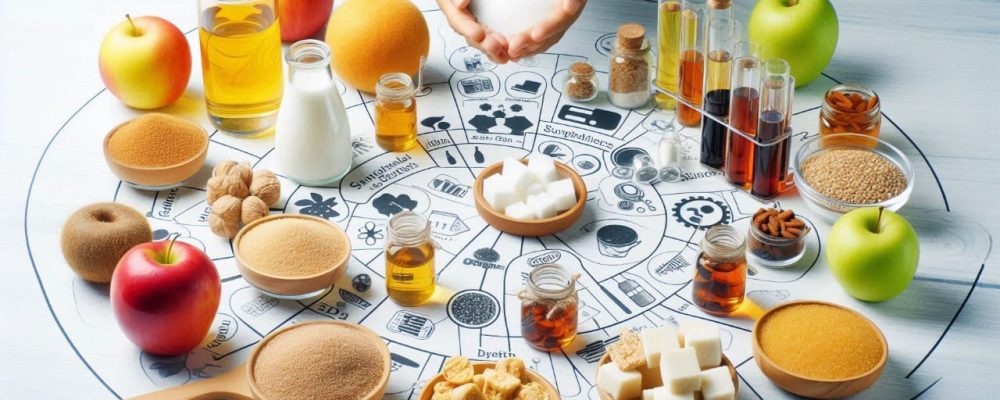Written and Reviewed by Team Pharmacally

In today’s health-conscious world, many people are seeking alternatives to refined sugar. These sugar substitutes can help with various dietary needs, such as managing weight and controlling blood sugar levels. However, with numerous options available, it is important to understand what these substitutes are, their benefits, and any potential downsides.
Why Consider Sugar Substitutes?
Refined sugar is commonly used but has been associated with various health issues, such as obesity, diabetes, heart disease, and tooth decay. For individuals aiming to lower their sugar intake, sugar substitutes can offer sweetness without the same caloric or glycemic effects. These substitutes fall into two main categories: natural sweeteners and artificial sweeteners.
Natural Sweeteners
Natural sweeteners come from plants and other natural sources. They are typically less processed than artificial sweeteners and can offer some nutritional benefits.
Honey: This natural sweetener is rich in antioxidants and has a unique flavour, along with some minor nutritional advantages. However, it is also high in calories, so it should be used in moderation.
Maple Syrup: This sweetener is made from the sap of maple trees and contains small amounts of minerals such as zinc and manganese.
Agave Nectar: Extracted from the agave plant, this sweetener has a lower glycemic index than regular sugar. However, it is high in fructose, which can negatively affect liver health.
Coconut Sugar: Derived from the sap of coconut palm trees, coconut sugar retains some nutrients like iron and potassium. Its calorie content is similar to that of regular sugar
Artificial Sweeteners
Artificial sweeteners are synthetic compounds designed to replicate the sweetness of sugar without the added calories. These sweeteners are much sweeter than sugar; meaning only small amounts are required. Here are some common types:
Aspartame: Often found in diet sodas and sugar-free gum, aspartame is calorie-free. However, it has been the subject of debate regarding its long-term health effects.
Saccharin: One of the oldest artificial sweeteners, saccharin is also calorie-free but may have a slightly bitter aftertaste.
Sucralose: This sweetener is popular for baking because it remains stable at high temperatures. Sucralose is widely used in sugar-free products.
Sugar Alcohols: Sugar alcohols, such as xylitol, erythritol, and sorbitol, are naturally occurring in some fruits and vegetables. They are commonly used in sugar-free candies and gums:
Xylitol: Derived from birch wood or corn, xylitol is known for its dental health benefits. However, it can cause digestive issues if consumed in large quantities.
Erythritol: With fewer calories and less digestive impact compared to other sugar alcohols, erythritol is a popular choice for those following keto and low-carb diets.
Novel Sweeteners:
These newer sweeteners are gaining popularity due to their natural origins and low-calorie content:
Stevia: Extracted from the leaves of the stevia plant, stevia is calorie-free and has a negligible effect on blood sugar levels.
Monk Fruit: Derived from a small green melon native to Southeast Asia, monk fruit sweetener is also calorie-free and can be up to 200 times sweeter than sugar.
Benefits of Sugar Substitutes
Weight Management: Low-calorie and no-calorie sweeteners can help reduce overall caloric intake.
Blood Sugar Control: Many substitutes have minimal or no effect on blood glucose levels, making them suitable for individuals with diabetes.
Dental Health: Some alternatives, such as xylitol, can help reduce the risk of cavities.
Potential Drawbacks:
Digestive Issues: Sugar alcohols may cause bloating, gas, and diarrhea in some individuals.
Taste Differences: Some substitutes have a distinct aftertaste that might not appeal to everyone.
Health Concerns: Artificial sweeteners have been scrutinized for potential links to health problems; however, regulatory agencies like the FDA deem them safe when consumed in moderate amounts.
Choosing the Right Sweetener:
The best sugar substitute depends on individual needs and preferences:
For natural sweetness with nutrients, consider using honey or maple syrup.
For calorie-free options, stevia or monk fruit are excellent choices.
For baking, sucralose or erythritol may work well.
Conclusion
Sugar substitutes offer a flexible way to enjoy sweetness while minimizing the health risks linked to refined sugar. By understanding the different types of substitutes and their effects, you can make informed choices that support your dietary and health goals. Remember that moderation is essential, regardless of which substitute you choose, to maintain a balanced and healthy lifestyle.
References:
1. How Sweet It Is: All about Sweeteners, US Food and Drug Administration, published on 09 June 2023
2. Facts about Sugar and Sugar Substitutes, Health, John Hopkins Medicine
3. Artificial sweeteners and other sugar substitutes, Healthy Lifestyle, Nutrition and healthy eating, Mayo Clinic, 10 Jan 2023
4. The truth about sweeteners, NHS, reviewed on 20 Feb 2023
5. Ghusn W, Naik R, Yibirin M. The Impact of Artificial Sweeteners on Human Health and Cancer Association: A Comprehensive Clinical Review. Cureus. 2023 Dec 29;15(12):e51299. doi: 10.7759/cureus.51299. PMID: 38288206; PMCID: PMC10822749
6. Sharma A, Amarnath S, and Thulasimani M, Ramaswamy S. Artificial sweeteners as a sugar substitute: Are they really safe? Indian J Pharmacol. 2016 May-Jun;48(3):237-40. Doi: 10.4103/0253-7613.182888. PMID: 27298490; PMCID: PMC4899993
7. Singh, S., Kohli, A., Trivedi, S. et al. The contentious relationship between artificial sweeteners and cardiovascular health. Egypt J Intern Med 35, 43 (2023). https://doi.org/10.1186/s43162-023-00232-1
8. Kossiva, L., Kakleas, K., Christodouli, et al, (2024). Chronic Use of Artificial Sweeteners: Pros and Cons. Nutrients, 16(18), 3162. https://doi.org/10.3390/nu16183162
9. Saraiva A, Carrascosa C, Raheem D, et al,. Natural Sweeteners: The Relevance of Food Naturalness for Consumers, Food Security Aspects, Sustainability and Health Impacts. Int J Environ Res Public Health. 2020 Aug 28;17(17):6285. doi: 10.3390/ijerph17176285. PMID: 32872325; PMCID: PMC7504156.
10. Artificial sweeteners and natural sweeteners: What to know, MD Anderson Cancer Centre, published on Feb 2017
11. Roberto Castro-Muñoz, Mariela Correa-Delgado, Rafael Córdova-Almeida, et al, Natural sweeteners: Sources, extraction and current uses in foods and food industries, Food Chemistry, Volume 370, 2022, 130991 https://doi.org/10.1016/j.foodchem.2021.130991
